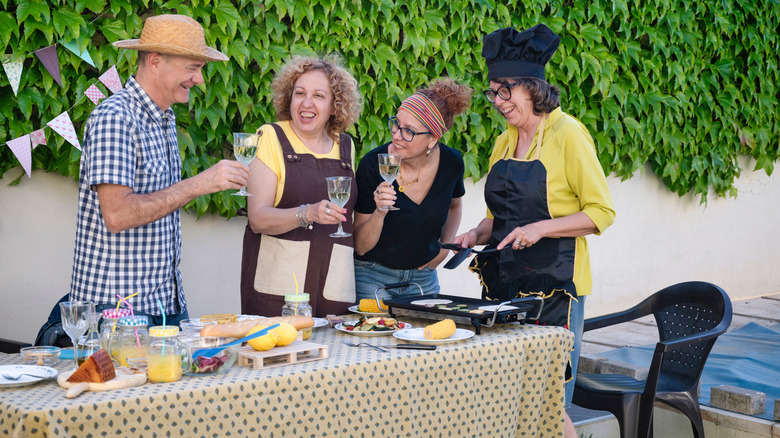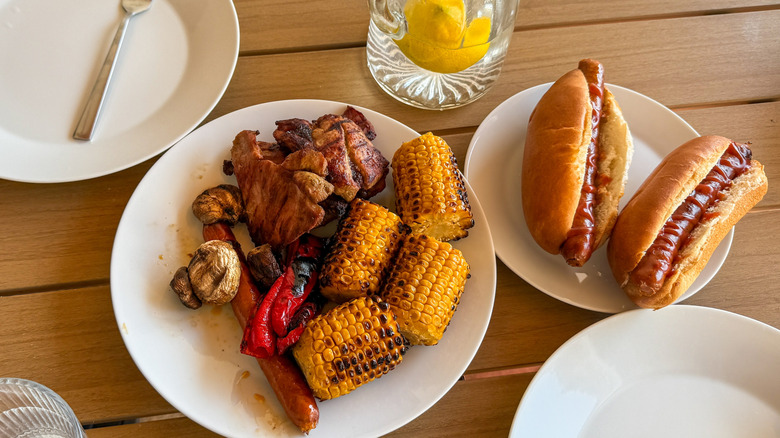When You Should (And Shouldn't) Bring Food To A Cookout
Bringing food to a gathering isn't always a welcome gesture, no matter how good the dish is. Don't be that person who rolls into the cookout with their "famous" three-cheese mac and cheese in tow, clearly trying to outshine everyone — host included. That's not a good look, whatsoever. Listen, there's a razor-thin line between being the cookout MVP and stepping on the host's toes just to prove, "Hey, I can throw down in the kitchen, too."
Your intentions might be totally noble, and bringing a tray of something might feel like good manners. But sometimes, the classiest move is showing up empty-handed (but still full of gratitude). In case you've heard it but need to hear it again, you don't always have to bring something to the cookout, and you shouldn't just take liberties.
Over time, I learned that a little awareness about the host, the setup, and the vibe can tell you everything you need to know about whether you should bring food or just show up ready to enjoy. Here's a foolproof plan to aid you on your next cookout.
Bring something when it's part of the plan
When the host actually asks for contributions, you've got the green light. Whether it's "bring your best side" or "dessert's up to the guests," this isn't just a polite suggestion. In this case, it's apparently part of the host's game plan. Showing up with a bag of ice while everyone else brought homemade food is ... not the move. In such a situation, it's a potluck-style kind of cookout, and your dish is part of making sure there's enough food to go around.
Even if no one gets assigned specific dishes for the potluck, bringing something like chips, watermelon slices, or drinks is a sort of unspoken agreement. You don't want to show up and seem cheap or unenthusiastic because you missed out on the coordination element. You don't want five guests showing up with the same tray of deviled eggs, either.
It's also good form to bring food if you have a dietary restriction and you're not sure the host can accommodate it. Instead of making it the host's job, bring a dish you can eat and share. That way, you're covered, and nobody's stuck making gluten-free buns at the last minute. Additionally, you might want to contribute food if you know the host well, and it's something you've done before. Some hosts love when friends pitch in, especially when the crowd is big. But again, ask first. As a bonus, this gives the host a better idea of how much food to make for the cookout.
Skip it when the host already has things covered
There are also times when bringing food just doesn't make sense. Some hosts treat a cookout like their stage, and they've planned every dish from the brisket to the lemonade. Showing up with a random casserole might not land well if there's no room in the fridge or space on the buffet table.
If the host hasn't asked for anything and the invite clearly says they're taking care of the food, believe them. Don't assume they're just being polite because you'll just end up embarrassing yourself and them. Bringing food anyway can feel like you didn't trust them to handle it, or, you're not a fan of their cooking. Even worse is when guests bring dishes that require prep, heating, or fridge space, so now the host is playing kitchen manager when they should be relaxing.
Lastly, avoid bringing food when you don't know the host personally. If you're a guest of a guest, it's better to arrive with a small gift or offer to help with setup instead of walking in with a big tray of pasta salad. Let the people who planned the cookout run the show. Making a food contribution isn't just about being generous, as you've got to be thoughtful above all. If it's invited, needed, or welcomed, go for it. But if it's unsolicited or out of sync with the host's plan, it's okay to just show up hungry and say thanks.


